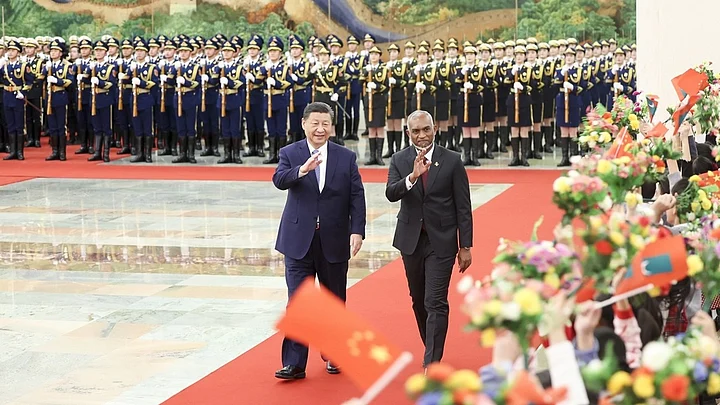India’s relationship with the Maldives started going downhill after the latter's elections in September 2023. Mohamed Muizzu won the presidential polls with the campaign slogan “India Out”. President Muizzu has been openly pro-China and this has resulted in a whirlwind in India-Maldives ties. It started with a war of words over Lakshadweep, to the docking of Chinese spy vessel Xiang Yang Hong 03, and the decision to evict Indian military personnel from Maldives. This has also resulted in India losing its top stop in the Maldives tourism sector to China on March 5, 2024.
During Muizzu’s visit to China in January 2024, the two sides announced the signing of 20 key agreements with a major focus on tourism. They also announced plans to begin direct flights. Bilateral relations were elevated to the level of comprehensive strategic cooperative partnership and Xi Jinping said, “Under the new circumstances, China-Maldives relations face a historic opportunity to build on past achievements and forge ahead.”
Taking a step further, the Maldives has announced the discontinuation of the agreement to undertake a hydrographic survey with India. Muizzu declared that the government is currently reviewing around 100 projects signed with India and that there will be a complete withdrawal of Indian military personnel from Maldives by 10 May.
He asserted, “There will be no Indian troops in the country come 10 May. Not in uniform and not in civilian clothing. The Indian military will not be residing in this country in any form of clothing”. The three aircraft given to the Maldives by India to monitor its maritime borders will now be managed by civilian personnel. The Maldives appears to have become the new foothold for China in the Indian Ocean region under President Muizzu.
The statements by Indian External Affairs Minister S Jaishankar asserting that India is no bully, and “big bullies don't provide four and a half billion dollars when the neighbours are in trouble” or provide vaccines, food and fertilizers, have been given a spin in the Chinese media, which has put the onus of the deteriorating relations on New Delhi.
An article in the China Daily reported, “Ironically, India is behaving like a bully. India is boycotting the Maldives in a big way, with Indian travel agencies cancelling trips to the Maldives, and Bollywood stars and athletes calling for a total boycott of the country, including imposing food and medicine sanctions, which is equivalent to cutting off the Maldives' lifeline”. In another article, China Daily had asserted, “India is a big country that has traditionally friendly relations with the Maldives. It should respect the sovereignty of its neighbour. Chauvinism and a big brother attitude will only further worsen relations between the two countries, and the stability of the region”. An indication of the Chinese propaganda being in full swing to build a narrative of the ongoing developments in India-Maldives relations.
To make matters more complicated for New Delhi, Male recently announced the signing of a military assistance deal with Beijing. It was signed between Maldivian Defence Minister Mohmed Ghassan Moumoon and Chinese Major General Zhang. Under this pact, China will be providing military assistance to Maldives without any cost and also helping in the non-lethal areas. However, no further details have been made public. This is the first time China and the Maldives have signed such an agreement.
The geopolitical situation is proving to be a test for India's diplomatic manoeuvring in the South Asian region. The lure of Chinese investments is pushing Male to welcome Chinese investment on multiple fronts. Since the Maldives joined the Belt and Road Initiative (BRI) in 2014, China has invested around 1.37 billion dollars and has also helped in the construction of the China-Maldives Friendship Bridge, and the upgrade of the Velana Male International Airport. With the signing of the defence pact, China has extended its foothold to almost all the areas.
A broader look shows that China has been making inroads in Maldives for the last decade. The Maldives in 2016 had leased the island Feydhoo Fenolhu to Chinese companies for 4 million dollars for a period of 50 years. There is speculation that the Chinese are now building a military outpost in the guise of tourist resorts. China has also been investing in infrastructure. Anti-India rhetoric, therefore, is bound to rise in the Maldives, even though India has been committed to providing humanitarian aid as well as medical assistance.
(Dr Gunjan Singh is an Assistant Professor at Jindal Law School, OP Jindal Global University. Her research interests are in the fields of Chinese Foreign Policy, China-South Asia Relations, Domestic Politics in China, Chinese Media, Mainland-Taiwan Relations and Space Security. This is an opinion piece and the views expressed are the author’s own. The Quint neither endorses nor is responsible for them.)
